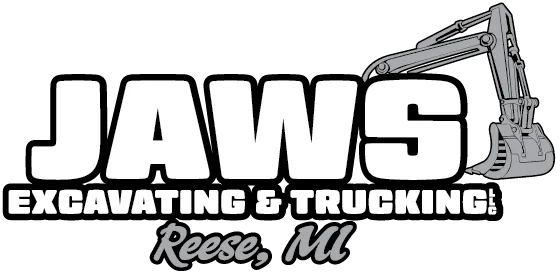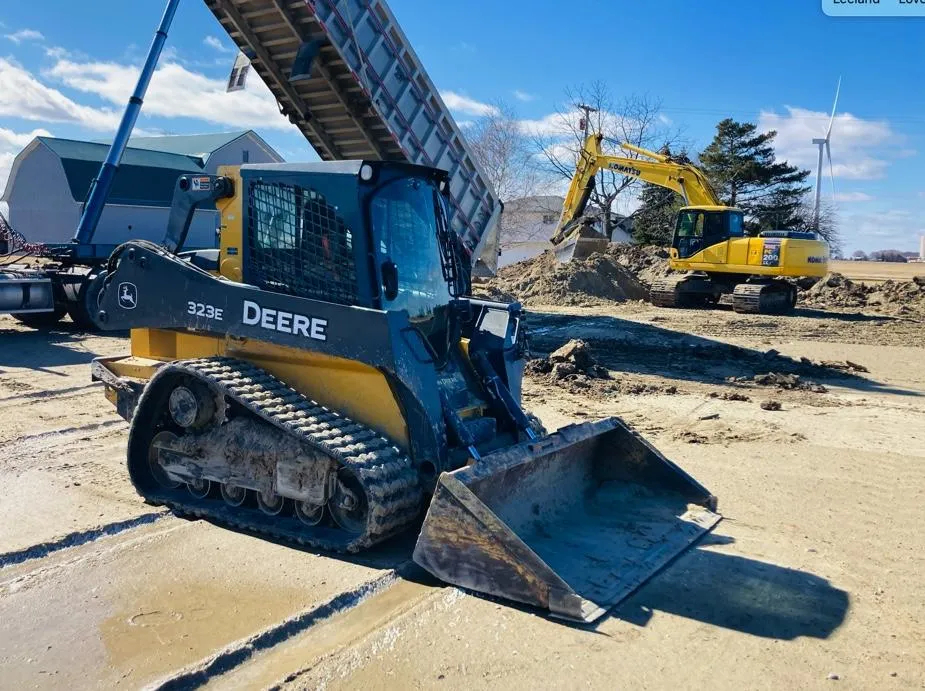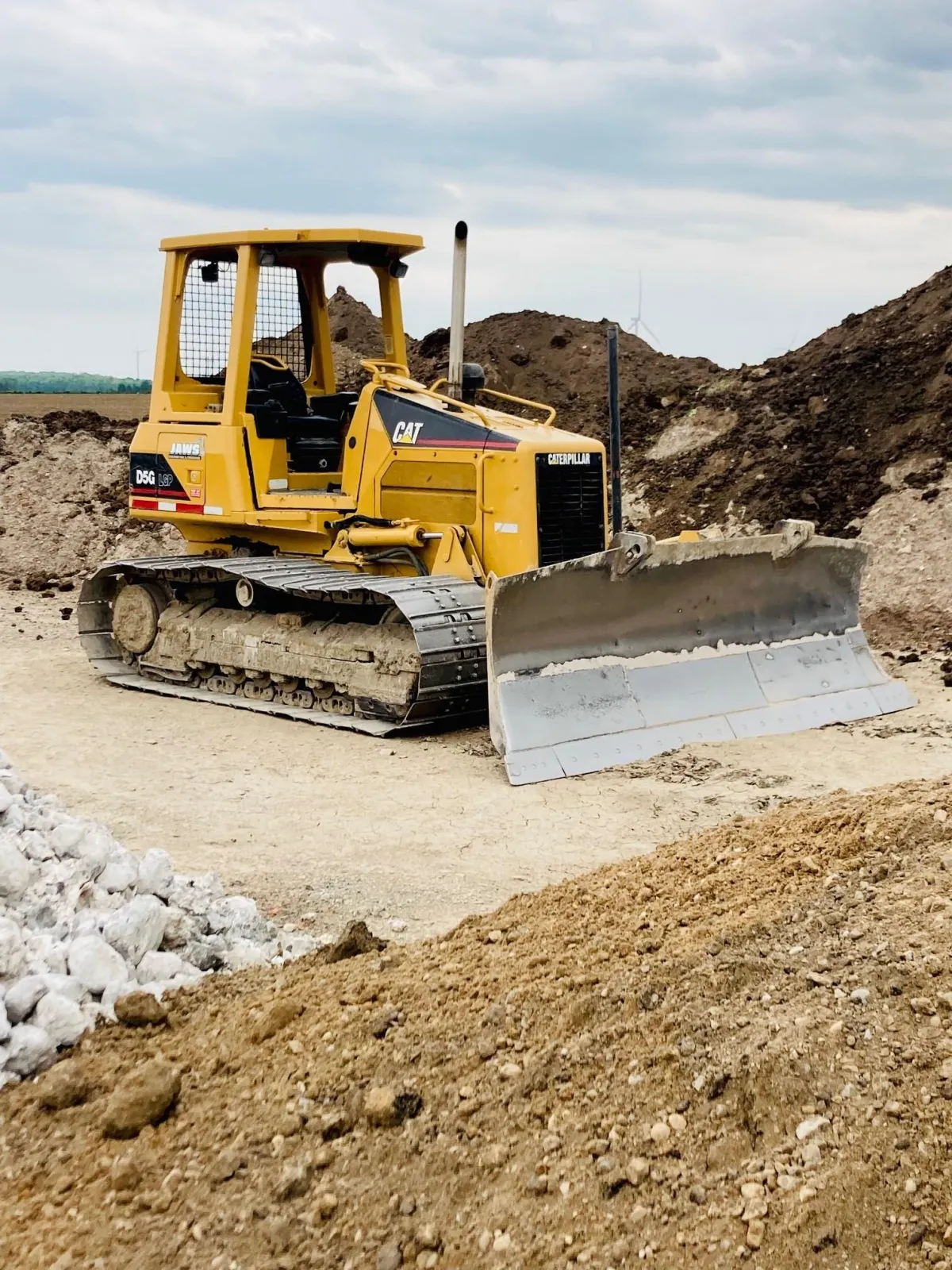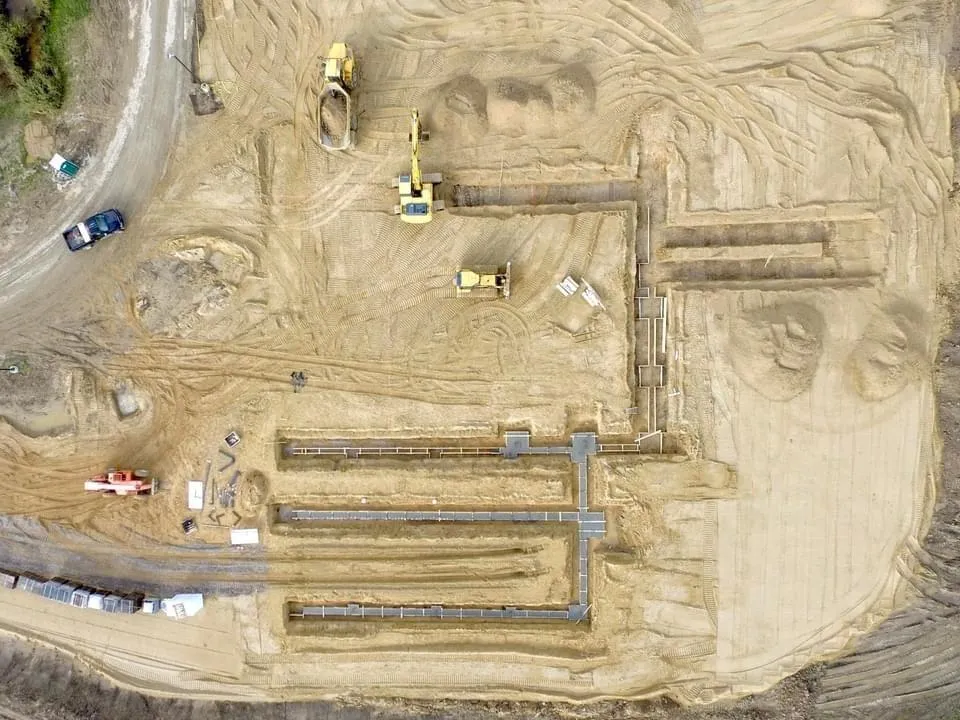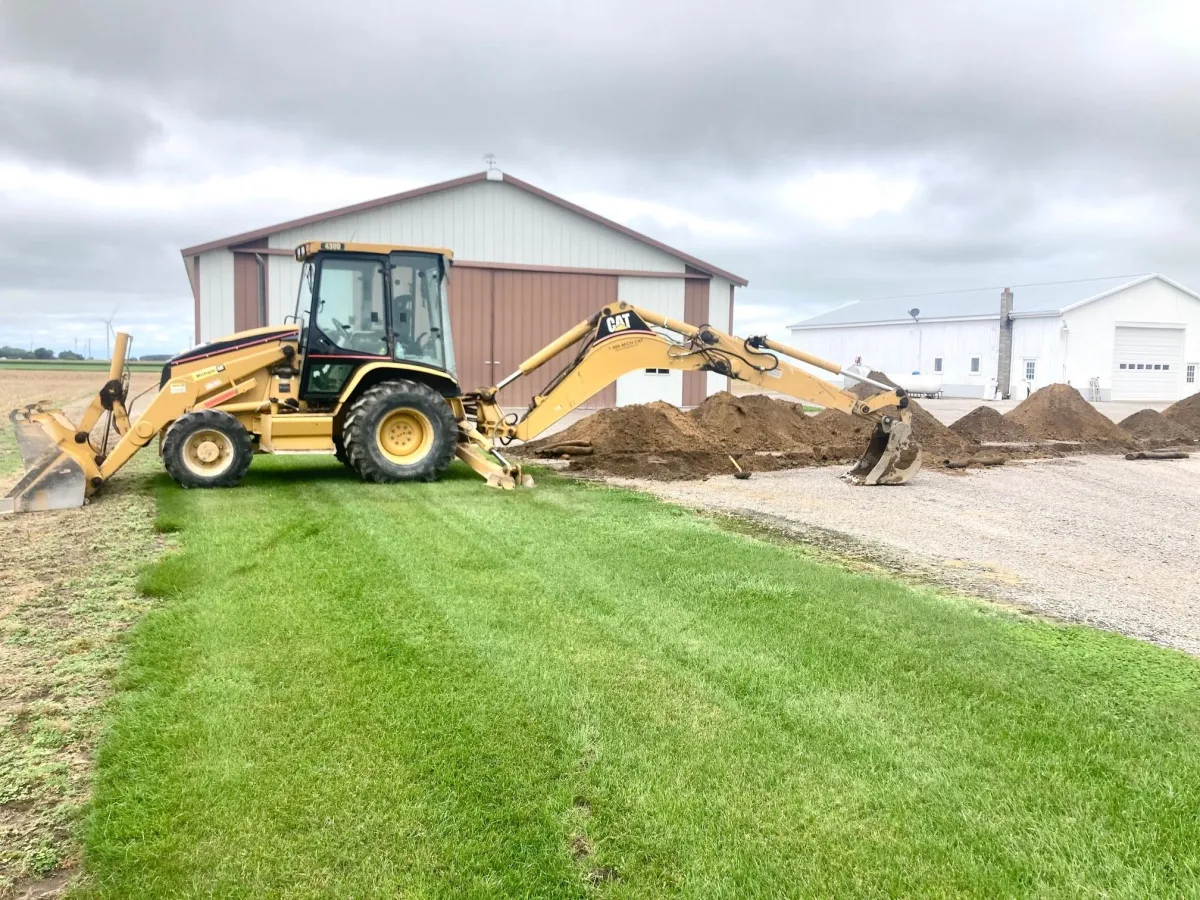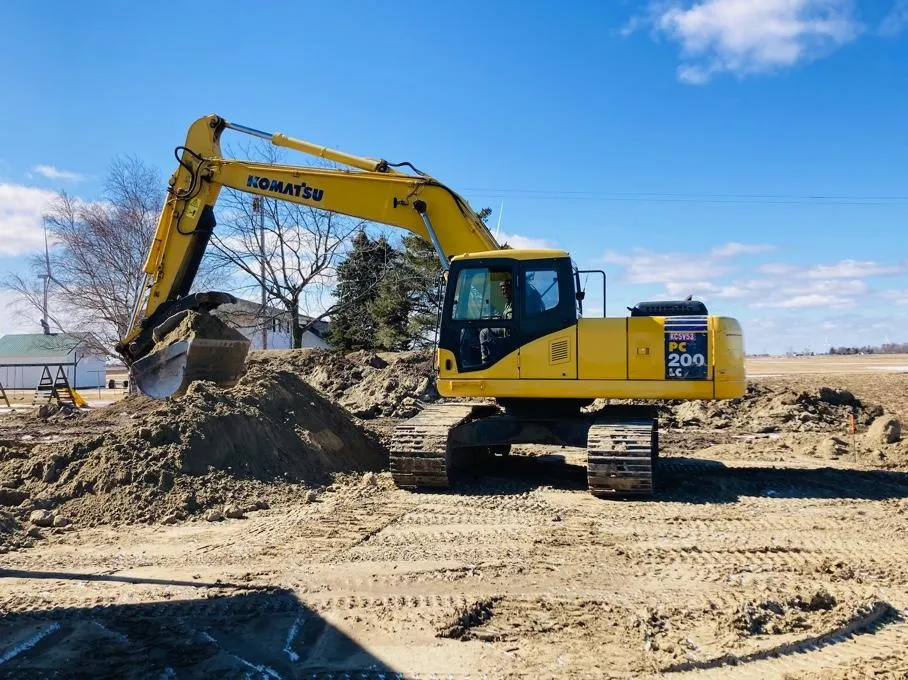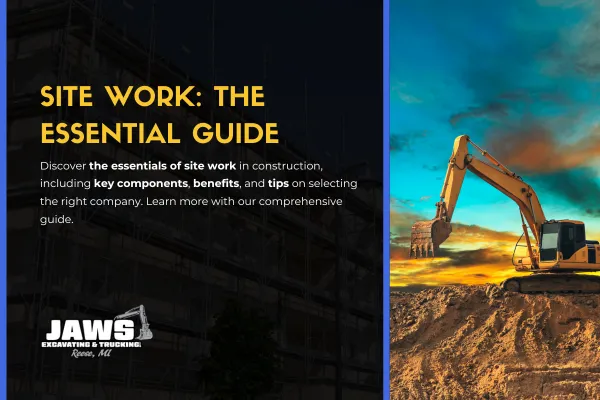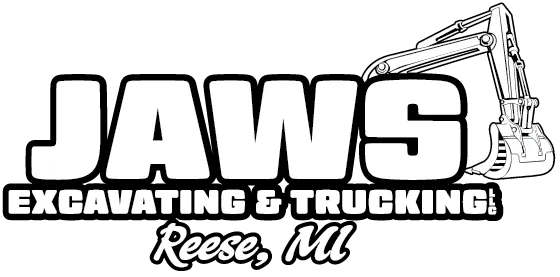Safety | Quality | Guaranteed
Learning Center

Site Work / Site Prep Michigan: The Essential Guide
Site Work / Site Prep: An Essential Guide
Before any building can begin, the land needs to be prepared. This is called site work, and it’s one of the most important parts of any construction or development project. It sets the stage for everything else that comes after. If the site isn’t ready, the building won’t be safe or last as long.
The First Step to a Successful Build
For business owners and commercial developers, knowing the basics of site work can make a big difference. Whether you're building a new store, warehouse, or office space, understanding what happens before construction starts will help your project run smoothly.
In Michigan’s Lower Peninsula, site work can look different depending on where you are. For example, preparing land in Detroit might involve removing old pavement or buildings. In more rural areas near Lake Michigan, it might mean clearing trees or managing soft soil. Every location brings its own challenges, so careful planning is key.
Site work includes important tasks like:
Clearing the land (removing trees, brush, or old buildings)
Excavating (digging holes or trenches for foundations)
Grading (leveling the ground so water drains properly)
Preparing the soil (so it’s strong enough to hold a building)
At JAWS Excavating & Trucking, we focus on these kinds of jobs every day. We understand Michigan’s weather, soil, and local rules. That’s why we made this guide—to help you understand the full site work process, whether you're building something small or large.
This guide focuses on the Lower Peninsula of Michigan, but we’ll also be releasing a guide for the Upper Peninsula soon.

Understanding Site Work
Definition and Scope
Site work is the name for everything that needs to happen on a piece of land before construction can begin. It includes the early steps that make the ground safe, level, and ready to build on. This part is very important because it sets the base for the rest of the project.
In Michigan, site work can be more complicated because the land and weather change a lot depending on where you are. From the thick forests in the Upper Peninsula to the busy cities in Southeast Michigan, every area needs a different approach.
Most site work includes these main steps:
Land Clearing: This means removing trees, bushes, grass, and anything else on the site—like old buildings or trash. In Michigan, workers also have to follow environmental rules, especially if wetlands or protected plants and animals are nearby.
Excavation: After the land is cleared, workers dig the ground to make space for things like basements, pipes, and building foundations. Because Michigan has many types of soil—like sand near the lakes or clay and rock inland—this step needs careful planning.
Grading & Leveling: Once the digging is done, the land must be shaped and leveled. This helps water drain away from buildings and makes sure the foundation sits on even ground. Michigan gets lots of rain and snow, so grading is extra important here.
Soil Stabilization and Compaction: If the soil is too soft or loose, it needs to be made stronger. Workers do this by pressing it down or mixing in materials to help it hold weight. This keeps the ground from sinking later on.
Utility Installation: Next, crews lay out pipes and lines for water, sewer, gas, and electricity. These must be placed at the right depth—below the frost line in Michigan—to avoid freezing in winter. Everything must follow state codes.
Roadwork & Paving: Site work also includes building roads, driveways, parking areas, and walkways. These need to hold up during freeze-thaw cycles and Michigan’s tough winters, so they’re built with strong materials and good drainage.
Before any of this physical work starts, the land must be surveyed to mark boundaries and elevations. Permits are also required. In Michigan, you usually need a Soil Erosion and Sedimentation Control (SESC) permit if the work affects one or more acres or is near a lake or stream. Plus, before anyone digs, they must contact MISS DIG 811 at least three business days ahead so underground utility lines can be marked. These planning steps are vital to keep the project safe and legal from the start.
Key Components of Site Work
Each part of site work plays an important role in getting land ready for construction. Below is a breakdown of the most important parts of site work, especially for projects in Michigan:
Land Clearing
Before you can build anything, the land has to be cleared. This means removing trees, bushes, roots, old buildings, and debris. It gives crews a clean area to work with so they can measure and plan properly.
In Michigan, land clearing can be different depending on where the site is. For example, clearing a city lot is not the same as clearing a wooded property. Crews also need to be careful not to damage protected areas like wetlands or habitats for special wildlife. Large machines like bulldozers and excavators are used to clear most sites, but smaller equipment—or even hand tools—might be used when the area is more sensitive.
Soil Excavation
Once the site is clear, the next step is digging. This is called excavation, and it makes room for things like:
Foundations
Basements
Trenches for pipes or wires
Michigan has many types of soil. Near the lakes, you might find loose sand that needs support. Inland, the soil might be hard clay or full of rocks. Because of this, excavation teams need to choose the right equipment and methods for each job.
Sometimes, crews run into groundwater. If that happens, they may need to pump the water out before continuing. Dirt and rock that’s removed is either saved for reuse or taken away by dump trucks.
Grading & Leveling
After digging, the land needs to be shaped and leveled. This is called grading. The goal is to make sure water flows away from buildings and doesn’t cause damage.
In Michigan, this is very important because of our weather—snow, rain, and melting ice can lead to flooding if the ground isn’t shaped properly.
Crews use equipment like graders and bulldozers, sometimes with GPS or laser tools, to get the right slope and elevation. In the end, you get a flat, stable area that’s ready for building.
Soil Stabilization & Compaction
If the soil is too soft or loose, it might not be strong enough to hold a building. In that case, crews will stabilize or compact it.
This can include:
Pressing the soil down with rollers
Adding gravel or crushed stone
Mixing in materials like lime or cement
These steps make the ground stronger and help prevent problems later, like sinking or cracking. In some tricky situations, engineers might recommend using special materials or drainage systems to keep everything solid long-term.
Utility Installation
A big part of site work is installing underground utilities, such as:
Water lines
Sewer or septic systems
Gas lines
Electric or phone cables
Each line is placed in a trench at the right depth. In most of Michigan’s Lower Peninsula, pipes must go at least 42 inches deep to stay below the frost line and avoid freezing.
Crews also add sand or gravel around the pipes, then pack the soil back down on top. Doing utility work during site prep is better than waiting—it’s much easier before buildings or roads are in the way.
Important: Before anyone digs, Michigan law requires you to contact MISS DIG 811 at least 3 business days ahead. This lets utility companies come mark where existing lines are buried so no one hits them by accident.
Roadwork & Paving
Most building sites need some kind of road access. That could mean:
Temporary roads for construction crews
Driveways
Sidewalks or parking lots
This work includes more grading, adding a strong base (usually gravel), and paving the surface with asphalt, concrete, or gravel.
In Michigan, roads and driveways need to handle freeze-thaw cycles, heavy equipment, snowplows, and salt. That’s why materials must be chosen carefully, and drainage systems like culverts or curb drains are often added.
If paving is done poorly, it can lead to cracks, potholes, or shifting after just one winter.
Erosion Control
Michigan law also requires erosion control during site work. This protects soil from washing away during rain or snowmelt. Common tools include:
Silt fences
Sediment traps
Mulch or straw covers
These are especially important near lakes, rivers, or steep slopes.
Equipment and Techniques
Site work needs many types of heavy equipment to get the job done. These include:
Excavators
Bulldozers
Dump trucks
Graders
Rollers
Skid-steers
Trenchers
Modern site work often uses advanced tools like GPS-guided machines and laser levels to help shape the land with accuracy.
In some cases—like when digging near gas or electric lines—crews might use hydrovac machines. These use water and a vacuum to dig safely without damaging anything buried.
The combination of the right tools, skilled workers, and smart planning makes a big difference. It helps the project move faster, stay safer, and avoid costly mistakes.

The Importance of Professional Site Work
Hiring professionals to handle your site work is more than just a first step—it’s a smart investment in the future of your project. Good site prep helps prevent problems, saves money over time, and keeps your build safe and legal. In a state like Michigan, where the land and weather can change a lot depending on location, having experts who know the area makes a big difference.
Here are the main reasons why professional site work matters:
1. Preventing Future Structural Problems
Professional site work helps your building last longer. When the land is cleared, dug, and leveled the right way, the foundation is much stronger. That means fewer chances for the building to shift, crack, or flood.
If shortcuts are taken—like not packing the soil well or grading the land incorrectly—it might not show right away. But over time, those mistakes can cause serious damage. In Michigan, where some areas have soft soil and others are rocky or wet, it’s especially important to have trained crews doing the job right. A strong building always starts with strong ground underneath it.
2. Meeting Michigan's Rules and Permits
Construction projects in Michigan must follow many local and state rules. These include:
Zoning laws
Environmental protection laws
Safety and building codes
Professional site work companies understand these rules and follow them closely. That includes getting the right permits, controlling erosion, marking property lines, and installing utilities properly.
For example, if your project disturbs over an acre of land or is close to water, you’ll need a Soil Erosion and Sedimentation Control (SESC) permit. A skilled contractor will take care of these permits and follow the right steps, so you don’t face delays or legal trouble.
3. Long-Term Benefits of Doing It Right
Sustainability
Good site work also helps the environment. Crews use tools like silt fences and drainage plans to keep mud and pollution from washing into lakes or rivers. This protects Michigan’s land and water and avoids fines or cleanup costs later.
Safety
A properly prepared site is much safer for everyone. Workers are less likely to get hurt on clean, level ground. Properly dug trenches, firm soil, and stable utility lines also protect people who will use the building in the future.
Saving Time and Money
Yes, quality site work costs money up front—but it often saves a lot more down the road. If something is done wrong (like poor drainage), fixing it later can be extremely expensive. A well-prepped site also helps builders move faster and finish the project on time, without costly delays or do-overs.
In Summary
Professional site work is the foundation of any successful construction project. It protects your investment, keeps your project on track, and makes sure your building is safe and strong. Skipping steps or hiring the wrong team may lead to bigger problems later, but getting it right from the start gives you peace of mind and a solid base to build on.

How to Choose the Right Site Work Company
Picking the right company to handle your site work is one of the most important decisions you’ll make for your project. Not all companies have the same skills, tools, or experience. Here’s what you should look for when choosing a site work contractor in Michigan’s Lower Peninsula:
Experience & Expertise
Choose a company with a strong history of doing site work. A team that has handled many types of soil, water problems, and tough situations will be better prepared for whatever your site throws at them.
Ask questions like:
Have you done jobs like mine before?
Do you have experience in this part of Michigan?
For example, a contractor who has worked in clay-heavy areas like Southeast Michigan or sandy areas near Traverse City will know how to handle those specific conditions. If your site has a high water table, you’ll want someone who knows how to safely manage dewatering and trench safety.
Don’t be shy—ask for examples or case studies of past work. A good contractor will be proud to show their results.
Licensing, Insurance, and Compliance
In Michigan, contractors must have the proper licenses and insurance. Before hiring anyone, make sure:
They have a builder’s or excavation license (as required by the state)
They carry general liability insurance and workers’ comp for their team
They’re familiar with local building and environmental rules
If your project is large, you might also ask if they’re bonded (which means they have extra protection in place in case they don’t complete the work as promised).
A contractor with the right licenses and insurance isn’t just following the rules—it’s a sign they’re responsible and professional.
Technology and Equipment
Good site work depends on good tools. Ask what kind of equipment the company uses. Are their machines new and well-maintained? Do they use technology like:
GPS or laser-guided grading tools
Software to plan and track the job
Special machines for muddy or wet sites
Better tools mean more accurate results—and often faster, cheaper work. A contractor who invests in their equipment is more likely to do the job right the first time.
References and Reviews
Hearing from past clients is one of the best ways to judge a company. Ask the contractor for references, and follow up. Questions to ask include:
Was the work done on time?
Did they stay within budget?
Were there any surprises?
How was communication?
Also check online reviews (Google, Yelp, Angie’s List). Positive reviews that mention things like “on time,” “great communication,” or “honest pricing” are good signs. If you see a few negative reviews, pay attention to how the company responded—that can tell you a lot about their values and customer service.
Safety Record
Safety is a top concern in site work, especially with large machines and deep digging. Ask:
Do you have safety certifications?
Do you train your workers regularly?
How do you handle dangerous tasks like digging near power lines?
You can even ask to see their OSHA safety log, which tracks any injuries. A contractor that takes safety seriously helps prevent accidents and delays—and shows they care about their team and your property.
For more information on regulatory compliance, please refer to Michigan's Bureau of Construction Codes
Questions to Ask Potential Site Work Contractors
Once you’ve found a few promising site work companies, it’s important to ask the right questions. These will help you understand their experience, process, and whether they’re the right fit for your project.
Here’s a list of smart questions to ask—and why they matter:
1. Can you show examples of past projects like mine?
Why ask: Seeing photos or hearing stories from similar jobs helps you know if they’ve handled your type of project before. Ask for before-and-after pictures, what problems came up, and how they were solved.
2. How do you make sure your work follows local rules and safety laws?
Why ask: Site work in Michigan must follow environmental laws (like erosion control and wetland rules) and safety codes. A good contractor should have clear steps for getting permits, training workers, and staying updated on laws.
3. What do you do to reduce noise, mess, and other disruptions?
Why ask: Construction can be loud and messy. Ask how they manage dust, noise, and waste. Look for answers like using water to control dust, recycling cleared materials, and keeping a clean site.
4. What happens if you run into unexpected problems on the job?
Why ask: Issues like hidden rocks, water, or old pipes happen all the time. A trustworthy contractor will explain how they stop work, talk with you, and find a smart fix instead of guessing or hiding the problem.
5. What’s the timeline for a job like mine? How do you stay on schedule?
Why ask: Time matters. Ask how long each part of the project might take (clearing, grading, utilities, etc.), how they plan for bad weather, and how they’ll keep you informed if things change.
6. What kind of machines and tools do you use?
Why ask: Good equipment means better results. Ask if they use GPS or laser tools for grading or if they have newer, well-maintained machines. The right gear makes the job faster and more accurate.
7. How do you handle budgeting and unexpected costs?
Why ask: You should know how pricing works. Ask if they use fixed bids or time-based pricing, and what they do if something costs more than expected. A clear process shows honesty and helps you plan better.
8. Can you share references from past clients?
Why ask: Talking to past customers is one of the best ways to know what to expect. Ask those clients if the work was on time, on budget, and how the company handled problems. Also, check online reviews.
Final Tip:
Asking these questions shows contractors that you’re serious and informed. Good companies will welcome your questions and answer them honestly. If they avoid answering or get defensive, that’s a red flag.
25 Questions To Ask Contractors Before Hiring
The Success of Any Construction Story
Let’s be honest—every great construction project starts with strong site work. It may not be the most exciting part, but it’s one of the most important. Site work makes sure the land is safe, level, and ready to support everything that gets built on top of it.
Here in Michigan, with its mix of weather, soil types, and strict rules, having experts who understand the land is a must. Taking time to properly clear, dig, and prepare the site helps you avoid delays, problems, and costly mistakes later.
Choosing the Right Team
Picking the right site work company isn’t just another task—it’s a major decision that sets the tone for your entire project. The right team won’t just show up with big machines—they’ll bring you confidence and peace of mind. A great contractor will:
Understand Michigan’s soil and weather
Know how to follow local rules and permits
Solve problems before they turn into delays
Whether it’s unexpected wet ground or special county permits, a skilled crew will know what to do and keep your project on track.
About Us: JAWS Excavating & Trucking, LLC
At JAWS Excavating, we’re not just contractors—we’re proud to call Michigan home. We specialize in the unique needs of site work in our state, and we love helping businesses build with confidence.
We don’t just move dirt—we guide you through the entire site prep process, step by step. From the first visit to the final grading, we’re here to make sure you feel informed, supported, and ready for what comes next.
Built on Solid Ground
Your project’s safety, strength, and success all start with the ground beneath it. That’s why choosing the right site work partner matters so much.
At JAWS Excavating & Trucking, LLC, we’re committed to delivering expert service and honest advice. When you work with us, you’re getting more than a crew—you’re getting a partner who wants to see your project thrive from the ground up.
Let’s start your construction story the right way—on solid ground.

JAWS Excavating & Trucking, LLC
We take pride in specializing in the nuances of site work that Michigan demands, and we're passionate about sharing our knowledge and expertise.
Our goal is to not only provide exceptional services but also to be a beacon of information and support for our clients, guiding them through their construction journeys with confidence and care.
The heart of a successful construction project lies in the thoughtful selection of a site work partner—a decision that profoundly impacts the safety, integrity, and success of your endeavors.
We're here to extend our expertise, support, and unwavering commitment to excellence, ensuring your Michigan project is built on solid ground, right from the start.
INVALUABLE EXPERIENCE
JAWS Excavating & Trucking, LLC
Superior communication
Quality work doesn't get done without excellent project communications.
UNMATCHED integrity
We understand that people do business with folks they trust. That's why we guarantee your satisfaction, every single time.
invaluable Experience
You wouldn't hire a mechanic to do your root canal. With us, you can hire with confidence.
UNMATCHED INTEGRITY
SATISFACTION Guaranteed
